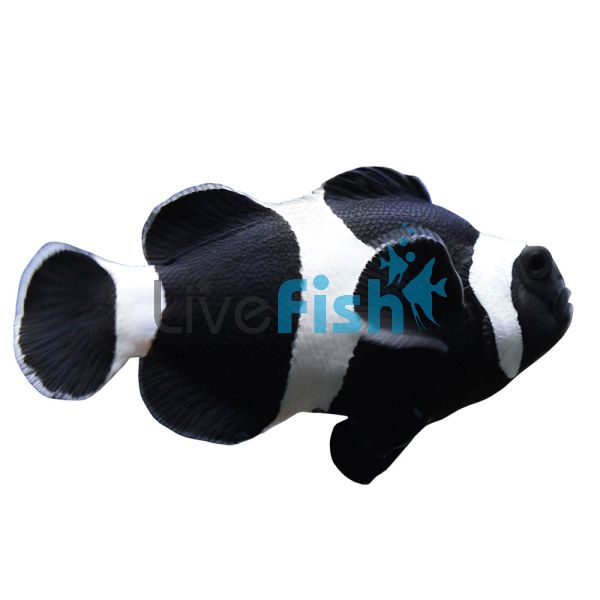2x Black & White Clownfish 3cm
Captive Bred stock
The Black and White Ocellaris Clownfish is a unique variation of the Ocellaris species. It is hardy, easy to breed, and great for beginners or experienced aquarists alike.
The Black and White Ocellaris Clownfish has an orange colouration when it is born. This darkens to a caramel shade as a juvenile, before it develops the black colour after around a year. Some adults may keep a little of the orange or caramel colour around their face and mouth. It has 3 white bands on each side of its body; - One behind its head, one down its middle, and one at the base of its tail.
The Black and White Ocellaris Clownfish is easily bred in captivity. Females can be identified as the larger member of a mated pair. In an aquarium environment, they stay close together. A pair will need a flat surface to deposit their eggs, which they will defend from other tank mates. These eggs usually take 6-11 days to hatch. Initially, the fry needs to be reared in a separate aquarium. First being fed rotifers, then baby Brine Shrimp.
The Black and White Ocellaris originates from the Coral Sea. This is east of the Great Barrier Reef and South of Papua New Guinea. They are also found off Darwin in Australia. They inhabit reefs and lagoons to a depth of around 15 meters. In the wild, it inhabits three anemone species. Either Stichodactyla gigantea, Stichodactyla mertensil, or Heteractis magnifica. Its relationship with the anemone is symbiotic.
Tank Recommendations for the Black and White Ocellaris Clownfish
Tank capacity needs to be at least 20 gallons (75.7 litres).
Black and White Ocellaris Clownfish are very hardy and easy to look after. They are great for a reef aquarium, but can also stay in a fish only tank.
They need plenty of rockwork and decorations for hiding, as well as open space for swimming. A host Anemone can be introduced for the Clownfish, but this will require a healthy system.
Suitable Tank Buddies
Black and White Ocellaris Clownfish are a semi-aggressive species. However, the Ocellaris has a reputation for being more docile than other Clownfish.
If a Clownfish has a host Anemone or a substitute host, they will be territorial and defend their area. This aggression is only localised to the hosts' close surrounding area. It won't create any problems in other areas of the tank.
Usually Compatible
Black and White Ocellaris Clownfish can cohabit with a variety of fish. Suitable companions include. Angelfish, Wrasses, Damselfish, Batfish, Foxface/Rabbitfish, Grunts, and Tangs.
Sometime Compatible
Keep an eye on Hogfish and Triggerfish. It is possible to house a variety of captive-bred Clownfish if they are introduced at the same time.
Rarely Compatible
Avoid large predatory fish that can swallow them whole. This includes Anglerfish and Frogfish, Groupers, Eels, Triggerfish, Sharks, and Rays. Seahorses and Pipefish aren't suitable tank companions in a community tank with Clownfish.
Feeding your Black & White Ocellaris Clownfish
The Black and White Ocellaris Clownfish is omnivorous. They will eat a variety of meaty products as well as some greens. A suitable diet should contain brine and mysis shrimp, krill, bloodworms, and spirulina flakes. If feeding them once a day, only add enough food for them to consume in around 5 minutes. If feeding 2 or 3 times per day only add food which can be consumed in 3 minutes.
| Scientific Name | Amphiprion Ocellaris |
|---|---|
| Care Level | Easy |
| Common Names | Black and White Ocellaris Clownfish, Black Perc, Black Percula Clown Anemonefish, Black and White False Percula Clown |
| Diet | Omnivore |
| Fish Family | Pomacentridae |
| Lifespan (years) | 20 |
| Max. Length (cm) | 7.5 |
| Min. Tank Volume (l) | 76 |
| Origin | The Coral Sea, but often captive bred. |
| Reef Safe | Yes |
| Sociability | Semi-aggressive |
| Venomous | No |
| Water Conditions | 22-26°C, dKH 8-12, pH 8.1-8.4, sg 1.020-1.025 |
-
0WHAT HAVE THE 3CM ORANGE AND WHITE CLOWNS BEEN EATING? HAVING TROUBLE GETTING MINE TO EAT. THANKS. GEOFFRead Detail
 Submited by: GEOFFREY WRIGHT
Submited by: GEOFFREY WRIGHT
 06 Sep 2020
06 Sep 2020
-
HI Geoff, As they are captive bred, they have been growing up on just the sinking pelletsAnswered by Admin on 10 Sep 2020
-
- 1




